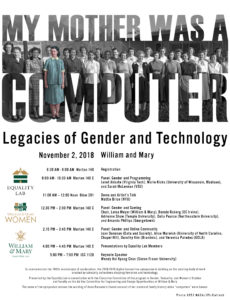Digital Humanities Symposium

November 2, 2018
On the campus of William & Mary
REGISTER Campus Map and Directions
To commemorate the 100th anniversary of coeducation, the 2018-2019 digital humanities symposium would build on the existing body of work created by scholarly collectives studying feminism and technology. In consultation with the Executive Committee of the program in Gender, Sexuality, and Women’s Studies and faculty on the Ad Hoc Committee for Engineering and Design Opportunities at William & Mary, the Equality Lab has designed a symposium with three major themes: 1) gender and programming, 2) gender and gaming, and 3) gender and online community. The name of the symposium echoes the wording of Anne Balsamo’s famed account of her maternal family history when “computers” were human.
PROGRAM
8:30 am – 9:00 am • Registration • Morton 140
9:00 am – 10:30 am • Panel 1 • Morton 140 C
The panel on gender and programming continues the conversation facilitated by William and Mary’s one book program, which will again feature Margot Lee Shetterly’s Hidden Figures, which recounts the important contributions by female computers of color working for the space program in Langley. Panelists with backgrounds in histories of women and computing include Janet Abbate (Virginia Tech), author of Recoding Gender and Inventing the Internet; Marie Hicks (University of Wisconsin, Madison), author of Programmed Inequality; and oral historian Sarah McLennan (VSU). Many of these works are highly accessible. An audiobook has been produced for Programmed Inequality.
11:00 am – 12:00 Noon • Demonstration and Artist’s Talk • Blow 201
Game designer and critic Mattie Brice (NYU) will be performing a demo and artist’s talk.
12:30 PM – 2:00 PM • Panel 2 • Morton 140 C
Chair, Leisa Meyer, William & Mary
The panel on gender and gaming speaks to the increased interest in both videogames and traditional sports, board games, and card games on the campus and efforts by Film and Media Studies to include more offerings about digital media. Panelists include Bonnie Ruberg (UC Irvine), author of Playing Queer: Sexuality, Gender, and Identity in Video Games Beyond Representation and editor of Queer Game Studies; Adrienne Shaw (Temple University), author of Gaming at the Edge and editor of Queer Game Studies; Celia Pearce (Northeastern University), author of Communities of Play; and Amanda Phillips (Georgetown).
2:15 pm – 3:45 pm • Panel 3 • Morton 140 C
The panel on gender and online community addresses an important area both for campus initiatives on equity, inclusion, and common ground and for the Mellon-funded curriculum on civic leadership, which emphasizes liberal democracy, diversity, civic engagement, and social issues and cultivates intellectual openness, public-mindedness, self-awareness, compassion, and integrity. Panelists include Joan Donovan (Data and Society), Alice Marwick (University of North Carolina, Chapel Hill), Dorothy Kim (Brandeis), and Veronica Paredes (UCLA).
4:00 pm – 4:45 pm • Presentations by Equality Lab members • Morton 140 C
5:00 pm – 7:00 pm • Keynote Lecture • Integrated Science Center (ISC) 1128
Keynote speaker Wendy Hui Kyong Chun of Simon Fraser University has already agreed to speak at William and Mary for the event. She is the author of a celebrated trilogy that includes Updating to Remain the Same: Habitual New Media (MIT Press, 2016), Programmed Visions: Software and Memory (MIT Press, 2011), and Control and Freedom: Power and Paranoia in the Age of Fiber Optics (MIT Press, 2006). She is a frequent keynote speaker at international conferences. She is a former engineer trained in systems design and is known for her appeal to interdisciplinary audiences. Her current work on abusive language online involves collaborations with computational linguists, software designers, media scholars, legal scholars, digital activists, and victims.
